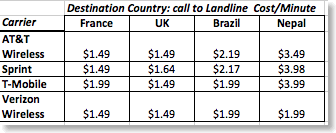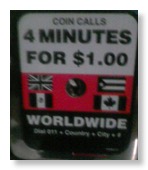Are Cell Phone International Calling Rates Legal?
For the purpose of regulating interstate and foreign commerce in communication by wire and radio so as to make available, so far as possible, to all the people of the United States,… a rapid, efficient, Nation-wide, and world-wide wire and radio communication service with adequate facilities at reasonable charges … there is created a commission to be known as the “Federal Communications Commission” 47 USC 151
The above quote is the original reason the FCC was created in 1934 and remains in the statute today. The following provisions of 47 USC 201(b) also remain in effect
All charges, practices, classifications, and regulations for and in connection with such communication service, shall be just and reasonable, and any such charge, practice, classification, or regulation that is unjust or unreasonable is declared to be unlawful
Section 205(a) also gives the Commission authority to “determine and prescribe what will be the just and reasonable charge or the maximum or minimum, or maximum and minimum, charge or charges to be thereafter observed”.
This post is a followup to a July 2010 post titled “International Calling Rates: A Case of Market Failure?” The table below shows the rates per minute for calls from cell phones in the US from the 4 big carriers to overseas land lines. (In many other countries there is a charge for incoming calls to cell phones so there is a reasonable surcharge on calls to cell phones in such countries. Here are sources of this data: AT&T, Sprint, T-Mo, VZW. Note that this discussion concerns outgoing international calls from the US, not overseas roaming where the carriers actually do incur more costs.)

The data is for 2 European countries, a rapidly growing developing nation, and a more remote country - hopefully a reasonable cross section of types of countries. So is $1.49-3.99/minute “just and reasonable”? Readers might recall a recent post here entitled “Telecom Too Cheap to Meter” which argued that the marginal price of voice telephony is rapidly approaching zero, in great contrast to when your blogger joined FCC in 1979 when long distance and international calling rates were a big issue. But that post dealt with reference points that were not clearly applicable to the cell phone market.

2 years ago I made a landline call to Asia to speak to my wife who was traveling there and in the haze of jet lag (having just returned myself) I hit the wrong button on our 2 line cordless phone and used Verizon rather than Vonage. The billed cost of the call was over $2/minute and totaled over $50. Being an FCC alum and knowing the cryptic corners of the FCC website, I made an informal complaint. Verizon did not fight the complaint and quietly marked the cost down to about $0.05/minute - which is a reasonable price. So I would suggest that any consumers who are billed for the above international rates of the major cell carriers to file such complaints and allege that the charge is illegal under the terms of 47 USC 201(b) and see if they capitulate the way the landline part of VZ did for me.
But FCC, why not take a pro consumer view and question the big 4 carriers on why their international rates are so out of line?



![Validate my RSS feed [Valid RSS]](valid-rss-rogers.png)

